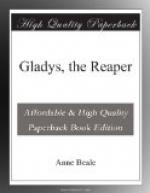‘Yes, quite sure.’
’And will you come and see me, Rowland? I used to think you cross too, but now you are very good to me. Do you think it was wrong of me to run away with Howel? You know he loves me; he says so, Rowland.’
Here Netta pressed her hand upon the letter that was
in her bosom, and
Rowland kissed her tenderly.
At intervals, during that day and the next, Netta made fitful efforts to exert herself, but it was evident to all that her body was getting weaker, and every one dreaded the journey in prospect, and longed for its conclusion.
Netta had taken a sudden and violent interest in teaching her child to read and repeat hymns. The hymns that it pleased Minette best to learn were some that Gladys had sung at her mother’s request. These Netta did not know by heart, indeed, her failing memory prevented her retaining anything she had once known; so an old hymn book was produced from Gladys’ book-shelf, which contained these hymns that she had been taught in her childhood by her mother.
It was the second evening of Netta’s stay with the Joneses, and she had been prevailed upon to go into the drawing-room, where Rowland was added to the usual little party.
She was gradually sinking into a state of apparent forgetfulness of those around her, from which it had been so difficult to rouse her since Howel’s letter, when Miss Gwynne said,—
’I think Minette knows the hymn now, Mr Jones. Ask mamma if you may say it, dear.’
’Mamma, may I try to say the hymn now? Mr Jones will take me to see the little children to-morrow if I know it,’ asked the child.
Netta was roused.
’Where is the book? I don’t think I remember it, she said.
‘I will go to Gladys for the book. I know the way, mamma.’
Minette ran to the little room where Gladys was at work busily preparing for the journey. She got the hymn book, asked Gladys to find the place, and returning to the drawing-room triumphantly, gave the book to Mr Jones.
‘You must hear me, to see that I say it quite, quite right,’
The hymn was somewhat difficult for a child, but it had taken Netta’s fancy, because the words were written for an old Welsh air that she knew well; indeed the book consisted principally of English and Welsh hymns that had been composed for some of the fine old Welsh tunes.
The words were as follow:—
MORNING, Y FOREU.
Great God, look on me,
From Thy throne eternal;
Make pure unto Thee
This my hymn diurnal.
I my grateful voice would blend,
With nature’s loud thanksgiving;
Praises through the earth would
send
For the bliss of living.
Then, God, look on me,
From Thy throne eternal,
Make pure unto Thee,
This my hymn diurnal.
On the wings of morning,
With songs of birds up-soaring,
I address Thee,
Praise and bless Thee,




